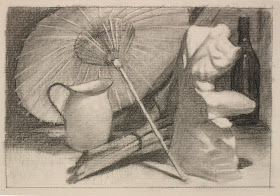 Yesterday was the weekly uninstructed Still Life class, so I did another smaller study of another set-up in the still life room, that leaves me one left to go, then maybe I'll either do a bigger painting or drawing of one of the set-ups. This is about 4 x 5 like all the other drawings in this series in charcoal on Strathmore Charcoal paper.
Yesterday was the weekly uninstructed Still Life class, so I did another smaller study of another set-up in the still life room, that leaves me one left to go, then maybe I'll either do a bigger painting or drawing of one of the set-ups. This is about 4 x 5 like all the other drawings in this series in charcoal on Strathmore Charcoal paper.One of the best things about this class is Mike Gallagher, our teacher is always stressing that this class is about what we want to do. he gives us an assignment, but then a lot of freedom to work in a variety of ways within the criteria of the assignment, in this case, a gray scale drawing.
We have to do five thumbnails first, then we are free to go do a painting or drawing. I decided to do five more finished studies to explore values, composition, edges and atmosphere, something I am really into exploring now, especially the more poetic aesthetic of atmosphere in a drawing. I have been looking at Thomas Anschutz, Surat and Edwin Dickinson in my exploration of this idea and get a lot of good feedback from both Mike but his two second MFA year teacher aids, Joe and Pat. I remember when I was a lot younger the idea of drawing or painting a still life would have been so completely boring to me, man, no way! I would have wanted to draw comics or a painting full of monsters and barbarians like a lot of young artists, but now I get a lot more out of doing these simpler studies and feel I am starting to get something in these drawings I have been working towards, which is still figural, even narrative, yet more poetic and not some literal "reporters" drawing of the set-up.
This is a powerful drawing also. The real lesson I take away from your work is how you complete an image. I get so caught up in noodling away at some spot in the drawing that nags at me. Your work is nearly always considered across the whole image and that is very smart.
ReplyDeleteThanks Dave, and that is one of the big reasons for my approach on these drawings. I too can get seduced by details, it's so easy to do especially if I am tired and have a day where I am not sharp. Maybe for some artists it's the opposite, but my years of training are in doing detailed drawing for comics, animation--that is my default setting.
ReplyDeleteSo, to remove this temptation I decided by working smaller, details are basically eliminated or added in last and I have to deal with the whole composition; also the eye see the whole composition at once within the cone of vision without moving to take it all in.
That is why thumbnails are so key to any type of drawing, painting or storyboard, etc.
I block in the composition and then mass in the 2-3 basic values. Then I start adding more specific details to clarify each object and have to decide how to group/push the values of each object, cast shadow, etc.,in either the dark, light or middle tone.
I find going back in with a stump and erasing or rubbing out areas, grouping them, etc., also really helps.
On the next one I'll take photos of my process.